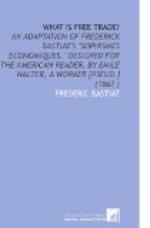What! because comfort and peace are correlative things; because it has pleased God to establish this beautiful harmony in the moral world; you are not willing that we should admire and adore His providence, and accept with gratitude laws which make justice the condition of happiness. You wish peace only so far as it is destructive to comfort; and liberty burdens you because it imposes no sacrifices on you. If self-renunciation has so many claims for you, who prevents your carrying it into private life? Society will be grateful to you for it, for some one, at least, will receive the benefit of it; but to wish to impose it on humanity as a principle is the height of absurdity, for the abnegation of everything is the sacrifice of everything—it is evil set up in theory.
But, thank Heaven, men may write and read a great deal of such talk, without causing the world to refrain on that account from rendering obedience to its motive-power, which is, whether they will or no, interest. After all, it is singular enough to see sentiments of the most sublime abnegation invoked in favor of plunder itself. Just see to what this ostentatious disinterestedness tends. These men, so poetically delicate that they do not wish for peace itself, if it is founded on the base interest of men, put their hands in the pockets of others, and, above all, of the poor; for what section of the tariff protects the poor?
Well, gentlemen, dispose according to your own judgment of what belongs to yourselves, but allow us also to dispose of the fruit of the sweat of our brows, to avail ourselves of exchange at our own pleasure. Talk away about self-renunciation, for that is beautiful; but at the same time practice a little honesty.
CHAPTER XX.
HUMAN LABOR—NATIONAL LABOR.
To break machines, to reject foreign merchandise—are two acts proceeding from the same doctrine.
We see men who clap their hands when a great invention is made known to the world, who nevertheless adhere to the protective system. Such men are highly inconsistent.
With what do they upbraid freedom of commerce? With getting foreigners more skilful or better situated than ourselves to produce articles, which, but for them, we should produce ourselves. In one word, they accuse us of damaging national labor.
Might they not as well reproach machines for accomplishing, by natural agents, work which, without them, we could perform with our own arms, and, in consequence, damaging human labor?
The foreign workman who is more favorably situated than the American laborer, is, in respect to the latter, a veritable economic machine, which injures him by competition. In the same manner, a machine which executes a piece of work at a less price than can be done by a certain number of arms, is, relatively to those arms, a true competing foreigner, who paralyzes them by his rivalry.




